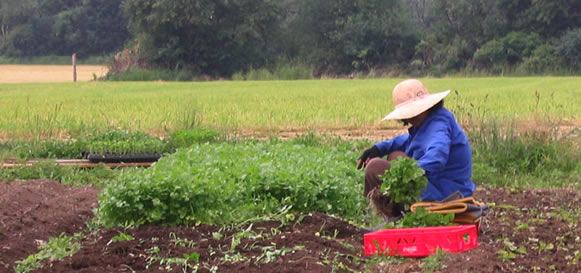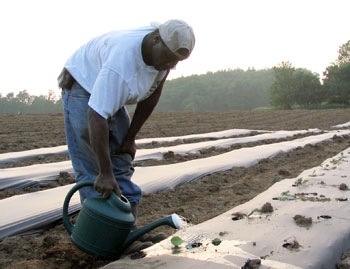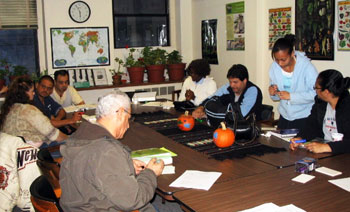Case Study 4: Lowell New Entry Sustainable Farming Project (NESFP)
 |
Farmer harvesting greens. Source NESFP website |
Introduction
Lowell, Massachusetts and Utica, New York are similar in their industrial past and also their tolerance for newcomers. A milltown that was one the hub of cotton production, Lowell housed and employed several waves of European immigrants in its heyday. When the textile industry left the northeast, Lowell suffered nearly a century of disinvestment. In the late 70s and early 80s, the town’s economy rebounded with the opening of a new National Historical Park, the emergence of a new high-tech manufacturing industry, and an influx of new Latino and Southeast Asian immigrants.<1>
Presently, this town of 100,000 continues to be a destination for immigrants and refugees. The International Institute Lowell, a major refugee service provider, boasts a clientele from more than 65 countries.<2> In addition, Lowell is home to the second largest Cambodian community in the U.S. (population estimated at 30,000).
The New Entry Sustainable Farming Project (NESFP) grew out of a farm mentoring program. Longtime resident, John Ogonowski, the pilot of American Airlines flight 11 that crashed into the World Trade Center on 9-11, was the first local farmer to share his land, labor, and knowledge with Cambodian farmers. Over time, this land-lease and skill building program evolved into a larger collaboration between the Tufts University, Community Teamwork, Inc., and other local organizations. The stated mission of NESFP is:
to assist people with limited resources who have an interest in small-scale commercial agriculture, to begin farming in Massachusetts,
to support the vitality and sustainability of the region's agriculture,
to build long term economic self-reliance and food security among participants and their communities, and
to expand access to high-quality, culturally appropriate foods in underserved areas through production of locally-grown foods.<3>
The NESFP has won several awards and has a detailed website. Here I briefly summarize the project and share information I garnered from an interview with Kimberley Fitch, the program and finance coordinator.
 |
Farmer watering crops. Source NESFP website |
Project Overview
Started in 1998, the New Entry Sustainable Farming Project helps refugees with limited resources start small-scale commercial farms. NESFP was one of the first initiatives in the country to assist immigrants in becoming commercial farmers. They operate a year-round training program that has graduated 60 participants (as of 2007). An 8-week classroom curriculum is built around business planning and marketing and a 12-week field training teaches principles of organic farming.<4>
Once participants finish the coursework, they can rent up to an acre on one of the two NESFP training farms. Farmers in training can also join a cooperative that sells produce at markets and through a CSA. After three years on the training farm, NESFP helps farmers transition to independence.
The program is run by Tufts University in partnership with Community Teamwork, Inc., a local CDC. It receives funding from a variety of public and private agencies, but the majority comes from the USDA Risk Management Association. Land-use for the two training farms is either donated or rented from established American farmers in nearby Dracut, 2.5 miles from downtown Lowell.
In the past nine years most of the farmers that have graduated from the NESFP training course were Hmong, Cambodian (Khmer), and West African. This is a reflection of the refugee population that has flowed into the lower Merrimack River Valley over the past thirty years. Recently Latino farmers have also joined the project. All reside in either Lowell or Lawrence, Massachusetts and commute to the farms. As was the case in Lewiston, transportation is a challenge.
Project |
Initiated By |
Serves |
Primary Goal |
Delivered Benefits |
Lowell Northeast Sustainable Farming Project |
Tufts University and CDC |
Immigrants, Asylees and Refugees |
Train immigrants to farm in the U.S. |
Fresh Food
|
What is Success? What is Sustainable
The primary goal of NESFP has always been to move farmers towards their own enterprise. Up until now, success has been defined as a graduate reaching independent status. However, only seven of their farmers have reached that milestone. Language barriers, low literacy, and time constraints make it difficult for a new immigrant to sustain a viable agricultural enterprise.<5> Many of NESFP’s farmers still work second shifts in factories and some must be home for their children. Considering these facts, Fitch told me that NESFP is beginning to look at other indicators.
 |
Farm Business Training Course. Source NESFP website |
=====
<1> “Decline and Recovery,” Lowell National Historic Park, http://www.nps.gov/lowe/photosmultimedia/decline.htm (accessed December 8, 2007)
<2> International Institute Lowell, http://www.iiboston.org/iiLowell.htm (accessed December 8, 2007)
<3> New Entry Sustainable Farming Project http://nesfp.nutrition.tufts.edu/about/index.html (accessed December 8, 2007)
<4> Kimberley Fitch, Interview by author, Cambridge, MA, November 20, 2007
<5> Ibid.